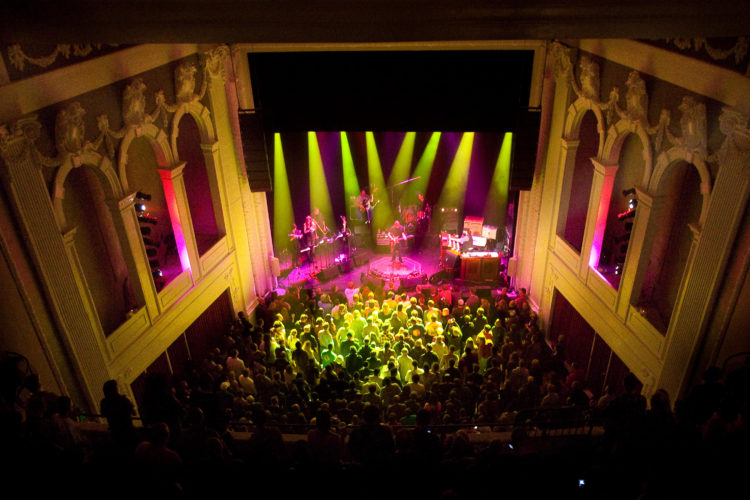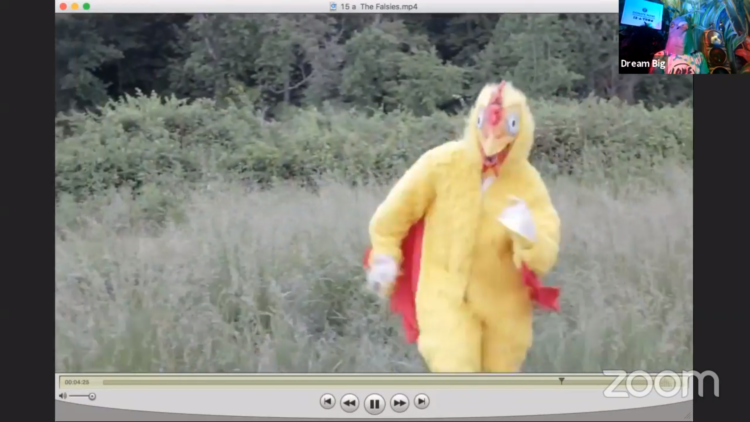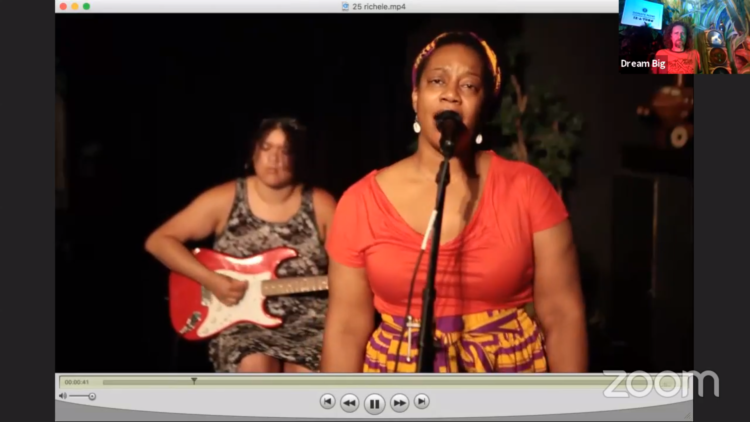Sprint Pavilion
“Normally, in April and May, we’re doing nothing but work — having four or five events a week, thousands of people in the venue,” said Kirby Hutto, the general manager of the Sprint Pavilion. “Normally, all of my seasonal part-time staff are on the clock and making money, and there’s just there’s really no time to do anything other than work because as you’re hosting the events now, you’re also planning the events for June, July, August and into the fall. So this is bizarre to be sitting around, doing nothing right now.”
Many people rely on the Pavilion’s shows for income during the summer. According to Hutto, a dozen staffers work every Friday to run Fridays After Five, the Pavilion’s weekly free concert series showcasing local musicians. For their larger ticketed shows, the Pavilion requires 120 to 150 workers, including stage crew and security and medical workers.
“All of those folks are impacted, and a lot of the people that work in our industry are truly gig workers. They’re going to work here when I have a show. And two days later, they’re going to work in Richmond, and after that, they might work in [Washington,] D.C., and then they’ll work festivals, and all of that revenue has dried up,” Hutto said. “Some of them have been able to get unemployment, at least for a while, but in our industry, the winters are always slow. So you’re looking forward to spring, you’re looking forward to when, all of a sudden, those checks are going to start coming in. And this year just hit right as everybody was getting ramped up. It’s devastating throughout the industry right now. At every level that you look at, from the artist to the staff that work the venues, the promoters, the marketing people, everything has come to a complete stop with no real light at the end of the tunnel.”
For the Sprint Pavilion, the base costs of putting on a socially-distanced show seem unsustainable.
“You’re going to have certain fixed costs to rent a [public address system] and bring it in, to staff the venue, to clean the venue,” Hutto explained. “That’s the thing that we’re going to struggle with is: OK, we get approval to open at 25% capacity, what amount of revenue is 25% yield for you? And will that pay an artist? Will that pay all your operating costs to actually host that event?”
Additionally, Fridays After Five normally depends on corporate sponsors and beer sales. “Sponsors are gone,” Hutto said. “We don’t have anyone on the books for this year. And beer sales, I mean, that is a line, that is a certain level of contact that takes place, and trying to reconfigure and reimagine how that’s going to work is still an unknown for us.” With no revenue, the Sprint Pavilion still faces costs to maintain the venue and pay the loan on the new roof put on last year.
In addition to their own staffers, the Pavilion usually pays $60,000 to nonprofits who provide volunteers to staff Fridays After Five. “On a typical Friday, we’re paying out a couple thousand dollars, which for a lot of these local nonprofits is a huge chunk of their revenue,” Hutto said. “The various causes are all over the map. It really cuts across the community. And you know, I think that between having the local volunteers working on behalf of the nonprofits and having the local artists perform, I think those have been really critical pieces of what has made Fridays After Five so successful and so well-loved for over 30 years now. So pulling that out of the summer just hits all the way across the community. Hopefully, we’ll be able to bring it back when it’s safe, but for this year I think it’s gone.”
Hutto stressed the extent to which entertainment drives the economy of downtown Charlottesville.
“There would be nights when we would have a sold-out show, the Paramount would have a sold-out show and the Jefferson would have a sold-out show. You know, that’s bringing 6,000 people downtown in the evening,” he said. “Most of them are probably going to have dinner somewhere. The cafes are going to be full, the bars are going to be full, there’s going to be people strolling by the shops. That all generates economic revenue for the city and for all the businesses downtown.”
Additionally, Hutto noted that 30%-60% of ticket buyers for national acts at the Pavilion are from out of the area, creating a huge tourism boost. “It’s absolutely the norm for people to come to Charlottesville for a concert at the Pavilion, and then stay over a couple days to hit a winery, to try out some of the restaurants that they read about,” he said.
While acknowledging the devastating economic impact of canceled events, Hutto stressed the dangers of a rushed attempt to reopen venues as legal restrictions are lifted. “We don’t want to wind up being, you know, like some of the videos that you saw from the weekend where people were just crammed together elbow-to-elbow in front of a sign saying ‘maintain social distance,’” he said. “If those places see big spikes and infection rates, that’s gonna take you back further than you were in March. And that’s what we have to try to avoid. We have to work to get our industry moving forward but do it in a very safe and strategic and low-risk way.”
Encouraged by new levels of communication and coordination within the industry, he hopes that a set of standardized best practices will eventually be developed so that patrons can be confident in their safety.
“There’s a lot of work to do between now and the day that we’re able to open the doors and show that, but that’s what we have to aim for,” Hutto said. “As an industry as a whole, it’s important that everybody keep that bigger goal.”
The Southern
“We don’t have a lot of venues, but there’s at least one of each [size], which is good, especially for a town this size,” said Danny Shea, the show promoter for the Southern Cafe & Music Hall. “If you look at the population of the town and surrounding counties, for the scale and volume of shows we get — and I’m not saying anyone takes it for granted — but people can really miss out on that oddness of it. …
“The venues are going to be last in line in terms of getting life back to normal. Even more than a sporting event, it’s really hard to envision a rock show with personal distancing.”
Currently, Shea is working to adjust the Southern’s business model to put the restaurant component at the forefront. “It’s a venue that also has a restaurant,” he explained. “But at least in the short term, maybe try to come back more the other way around, like a restaurant that has performances.”
The Southern has been trying to make the most of the time closed to make improvements to the venue that had already been planned. Shea noted that a lot of these improvements — like increasing sight lines in the room, which enables for a more spread-out crowd — are complementary to the kinds of social distancing practices he imagines they will need to embrace once reopening is possible.
While pushing to stay optimistic and approach this time as an opportunity to re-envision venues, Shea acknowledged the uncertainty underlying every venue’s efforts right now. “It’s a tough business no matter what, even in the best of times, and venues do come and go,” he said. “Who knows if I’m just rearranging the furniture on the deck of the Titanic.”
Shea and Jeyon Falsini, an assistant manager at the Southern, are exploring ways to incorporate streaming into the venue, starting with bringing back the Southern’s weekly comedy night over Zoom, accessible on Facebook. For a comedian, the reaction of the audience is especially important. Falsini discussed setting up a large projector screen to go in front of livestreamed performers, so they can see the Zoom audience react to their sets. Even once a live audience can return, the screens will likely stick around.
“I think that it’s going to be a metamorphosis from where we are now to normalcy, and I would think that streaming is probably going to be forevermore a part of the puzzle,” Shea said. He explained that, prior to the pandemic, streaming had seemed more an obstacle to venues than something that could help generate revenue, as it could disincentivize people from attending events in person. Now, it will be an important way to expand access if in-person shows are to return with lower physical capacity. Shea noted that people who couldn’t come to shows in-person even before the pandemic might be able to tune into the livestream. Additionally, Falsini noted that as long as social distancing is necessary, in-person tickets will likely be significantly more expensive than before, given reduced venue capacity. Keeping the livestreaming as an option could present a cheaper alternative.
However, in a world of online streaming, Falsini worries that the competition for patrons will become global. “If there’s so many Zooms out there to see, you might not want to watch the Zoom of your local band playing at your local venue, you might want to watch the Zoom of Beyoncé playing at the Taj Mahal, you know?” he said.
“It’s going to be a more virtual world, for better or worse,” Shea said. “There’s always a better and worse.”
Typically, the Southern hosts a mix of local and touring acts, but Falsini anticipates that local bands will be the first to return to the stage, given the additional costs and public health risks of going on tour. However, for local artists, venues are only one piece of the puzzle. Shea described the Southern as a platform for local music that is cultivated in the restaurants and the bars.
“Those places are stages where people kind of get their legs,” he said.
Now, small local bands lack that opportunity to gather an audience. Some of these places, like Moe’s Barbecue and The Whiskey Jar have already resumed live music, while attempting to adhere to social distancing guidelines. Others are holding off, with doubts as to whether they can get patrons to follow a set of social distancing rules.
While these smaller stages help local acts gain the audience required to play at the Southern, the Southern helps them grow in turn to play larger venues, like the Jefferson.
The Jefferson

A packed Jefferson Theater before the pandemic.
Credit: Courtesy of Jonathan Drolshagen
Despite the difficulty of maintaining a large, old building with no revenue, Jonathan Drolshagen, the general manager of the Jefferson Theater, expects the venue to outlast the pandemic.
“We’re very fortunate that we have an owner who is very engaged and cares for the Charlottesville community and nurturing the Charlottesville music scene,” he said.
“It’s a really special room,” he added. “You know, there’s so many rock ’n’ roll clubs that are very utilitarian. It’s like you had a big room, everything is spray painted, it’s kind of built to take a lot of abuse, and we’ve got this beautiful, charming vaudeville theater here, which is a really special place to see music if you’ve been to as many clubs around the country as I have. People love this room. It has so much character, and it becomes a hub for so many important events other than concerts for the Charlottesville community as well.”
Though Drolshagen believes the venue will make it through this pandemic, he worries about those who rely on working in-person events at the Jefferson and elsewhere for income. Each show requires three to ten production contractors, along with a restaurant staff, a box office staff, and a security team.
“For those folks that are production contractors, that really do the heavy lifting for putting on the shows, it’s probably been the toughest,” he said. “Safety is a paramount concern, but there’s no question that it’s tough to lose all economic activity for such a long period of time, and certainly disconcerting to not know when the end of it is.”
The Front Porch

Orion Faruque plays for The Front Porch's Save the Music.
Credit: Screenshot by Marie Ungar, with permission from Emily Morrison
While the second phase of Virginia’s reopening is meant to begin as early as Friday — easing the limit on social gatherings from 10 people to 50 people — Emily Morrison, the executive director of the Front Porch, said she can’t imagine opening her venue any time soon.
“We’re making decisions that impact our businesses, that impact a lot of employees, and then also impact public health, and we aren’t given a whole lot of guidance,” she said. “My opinion if that’s what you’re asking is that until we have massive testing infrastructure in place, really good technology for contact tracing, and a vaccine, it does not make sense for giant groups of people to be gathering. I think that there’s still some question about how it could potentially be managed for an outdoor event, and I think that there are people who are really looking at creative ways to help people socially distance.”
“I’m certainly open to how that could work,” she added. “We’ve talked about having a picnic blanket party where we have 50 people come and we’re in a big space and everybody stays in their picnic blanket, and we have a concert. I can imagine doing that.”
In the meantime, the Front Porch has been working to keep music alive through Save the Music, a virtual concert series livestreamed from their venue, focusing on local musicians. The series is underwritten by a major donor, which allows the Front Porch to pay the musicians and raise money for other nonprofits.
“It’s just been super cool to get to do it because it feels like we’re contributing to the community through music,” Morrison said. “Charlottesville is so rich in terms of the number and depth of talent of our musicians that it’s just been so easy to book.”
The series will include three livestreamed concerts a week, currently funded through the end of August. Morrison said she’s talked to a lot of other venues who have thought about doing something similar but can’t quite figure out the monetization part of it.
“That’s one of the things about being a nonprofit that is a real advantage. Nonprofits often emerge in times of crisis as community leaders, and the Front Porch has been able to move into that space in this time,” Morrison said. “My venue has always broken even. It’s never been a profit generator for the business. And so it was a very easy decision for us.”
Additionally, the Front Porch has shifted their jam sessions to Zoom, holding three or four per week. Morrison says these sessions tend to be populated by the people who already attended jams at the Front Porch prior to the pandemic.
“Because of the latency issues with Zoom. It’s tricky to play music actually together. So typically what will happen in an online jam session is that people will take turns leading a song, and everyone will mute their microphones, and then that person will play and people will just play along at home, and then they talk,” Morrison said. “Honestly, it’s this really wonderful way for them to see each other and communicate through music.”
IX Art Park

The Falsies released a new music video during the IX-a-thon.
Credit: Courtesy Susan Krischel
Susan Krischel, the executive director of the IX Art Park, noted that because IX only recently obtained nonprofit status last September, they perhaps lack the long-established donor base of some other nonprofits. Normally, IX depends on live performances to keep running. Fortunately, IX was able to receive a Paycheck Protection Program loan to retain its employees. “The jobs may look a little different than they normally would obviously,” Krischel said. “The staff has kind of redirected to doing online activities.”
As social distancing measures were just beginning, the IX Art Park hosted a livestream-only performance by local band Kendall Street Company from Inside the Looking Glass, the park’s immersive art space. IX is planning to host more livestreamed shows, and Krischel hopes to continue to keep these free.
“We rely upon the generosity of those people who are in a good financial condition to help us bring music to people who perhaps aren’t,” she said.
This past Saturday, the IX Art Park hosted the IX-a-thon, a 10-hour, virtual variety show with more than 50 musicians and other performers, most of whom broadcasted from their homes. The IX-a-thon was livestreamed on the IX Art Park’s Facebook page and received over 6,000 total views. During the live broadcast itself, IX raised about $1,650 in donations to stay afloat.
Krischel noted that music is especially important amid the anxieties of the pandemic. “We’ve been trying to come up with creative ways to keep music alive, because I think music is a really important healing process, too,” she said.

Richelle Claiborne and Harli Saxon performed during the IX-a-thon.
Credit: Courtesy Susan Krischel











